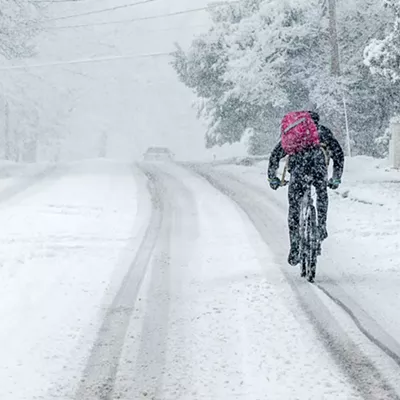Dave Kokot wants me to watch a video of 100 people burning to death. He says it’s not too gruesome — I’ll only see one person actually consumed in flame. But he says watching the Station nightclub burn down before my eyes — knowing that 100 people who went to a Great White show that February night in Rhode Island are trapped inside — will help me realize why building codes are important. I pass.
Kokot isn’t just some fire safety sadist. He’s a fire protection engineer with the Spokane Fire Department, and it took some doing to get him on the phone. He and his compatriots at the fire department have gotten a lot of shit lately, and their first official response to my calls was, “We won’t be talking to The Inlander about the sprinkler issue.”
Not very nice, but their initial reticence was understandable. Over the past few months, the department has stepped up its efforts to enforce a fairly new Washington state building code that put in place stringent fire safety rules for “nightclubs.” Basically, the codes says if a club, bar or venue has even a smallish dance floor (less than 20 feet by 20 feet), it’s a fire danger and needs a sprinkler system installed. The venue needs to do this by Dec. 1, or face being shut down.
As messengers of the code, which states across the nation adopted after the Great White massacre in 2003, local fire inspectors are on the receiving end of some very angry music venue owners. The angriest: Empyrean’s Chrisy Riddle.
The Empyrean, nestled between the shuttered Otis Hotel and the City Gate (a food bank for the homeless), is a comfortable spot in an uncomfortable part of town. Inside the venue’s front room — which has mishmash coziness and acts as a coffeehouse by day — I’m sitting with Riddle, who is also an English teacher at Central Valley High School.
But it’s the back room that threatens her business. There, a stage lords over 620 square feet of dance floor and seating. Most nights, a random assortment of fold-up chairs face the stage in a most organized manner. It’s a perfect place for singer songwriters to have the audience’s full attention. But with a quick sweep of the collapsible chairs, the Empyrean suddenly exceeds the fire department’s strictures on dance floor size.
Riddle tells me she was first informed of the law in March of last year, when she was mailed a form letter from Fire Marshal Lisa Jones. The letter informed her that the Empyrean “may be required to install fire sprinklers as a result of this revised law.” Riddle got in contact with Deputy Fire Marshal Tom Oliver and she says he told her not to worry about it. She was fine. She took his advice.
Shows went on, no sprinklers needed. Then in mid-May, more than a year after the first letter, she got another note saying that she had to install a sprinkler system or face being shut down on Dec. 1. Riddle fired off emails to Fire Marshal Jones and the two volleyed replies back and forth. Riddle wrote of “inconsistencies” in the code, while Jones said there were “misunderstandings.” The exchange grew politely heated until Riddle accused the fire department of picking on her. “With all due respect,” Jones wrote back, “the Empyrean is not being singled out.”
“She has not been singled out,” says fire engineer Kokot, reiterating Jones’ stance. “She’s one of the last few facilities that is either having difficulty understanding or difficulty complying” with the code.
“We can’t waive the code,” says Spokane Mayor Mary Verner. “We can’t help one business, but we can help a class of business. … We’ve really been trying to find a creative way to deal with this, including bringing in our community development board” to find grants to help fund sprinkler installation. Riddle estimates it would cost her about $10,000 to put sprinklers in. Michael Adolfae, director of the city’s community development department, says helping local businesses with grants is looking more and more unlikely. “We thought we could bring water mains up to these properties [using stimulus money],” he says. “But we have not been able to find the secret to do it.”
In the recent Crunk Roost, a music ’zine she edits, Riddle fired everything she had at the fire department. After saying that meeting the new code’s standards is “a tough bow in tough economic times [that] will cripple many venues,” Riddle encourages her readers to “exercise your rights as a citizen and contact your senator, mayor, and local media.” But word had already gotten out, and her readers exercised their rights in the back of the ’zine. In the “Stroke ’em or Pluck ’em” section, where anonymous readers spill their deepest thoughts, three comments are directed at the fire department, mostly comparing its inspectors to the endpoint of the digestive tract.
It’s a bit ugly, but the ugliest came when Riddle named names, says Patrick Kendrick, the booker at Caterina Winery. Not long after the fire department revisited the Empyrean and told Riddle to come up to code or else, they came knocking on Caterina’s door.
“He said those exact words, that he came in because of another venue,” Kendrick says of the fire inspector who reviewed the winery. Fire engineer Kokot says inspections are performed based on a few factors: when the last one was done, if changes have been made to the venue and, most importantly, if there have been complaints made against the venue. “[Riddle] gave us multiple names of businesses and that has made us go out and conduct inspections.”
Caterina is doing “anything they want us to do … to appease the powers that be,” Kendrick says. Estimates for the work range from $10,000 to $20,000. “I’m sure we would have been on the [fire inspector’s] list eventually,” Kendrick says, but adds, “There’s no need for narcing. There’s enough narcing in the world.”
Riddle says she didn’t out other venues in a vindictive way. She insists she truly thought there were inconsistencies in the law. In her correspondence with Jones, she received a list of five venues or clubs that were in violation of the law.
“They’re all dance clubs,” Riddle says of the inconsistency. “Except Empyrean.” Beside the Empyrean, the list named Ichiban, Talotti’s 211, Trick Shot Dixie’s (now the Emperor) and Dempsey’s Brass Rail.
At Dempsey’s, Leonard Jenkins says he is bringing his bar into compliance, but did not want to comment for this story, mainly, he says, because he didn’t want people to know how much he had to spend to bring his bar up to code. Ichiban had plans for a club, but dropped them after the price tag of a sprinkler system came up. The Emperor shut down for seven months for renovation and to make their space code-friendly.
But Riddle’s digging her heels in. “We don’t know [what we’re going to do]. … It’s a little bit bleak,” she says. “Unless there’s a loophole, we plan to close Nov. 30.”
























